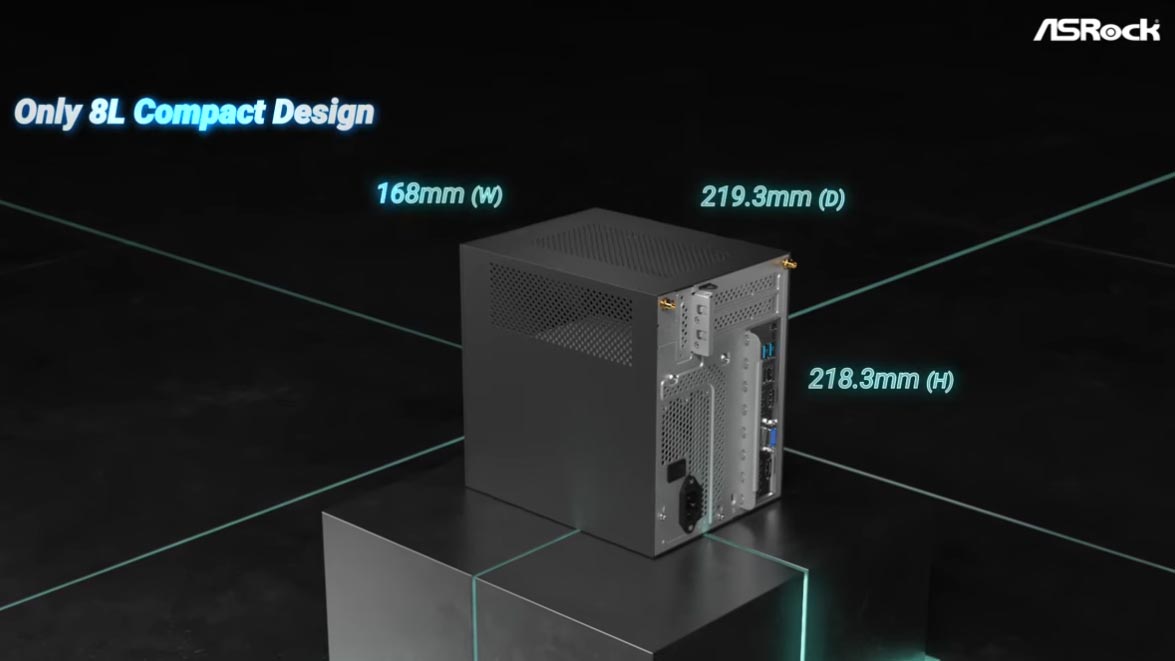ASRock DeskMeet Mini-ITX PCs Support Alder Lake, AM4 and Discrete GPUs
DeskMeet B660 for Alder Lake, DeskMeet X300 for AMD AM4.
PCs and components maker ASRock has designed a couple of interesting new 8 liter barebones systems ready for your choice of 12th Gen Intel Core Processors (Alder Lake-S, ADL-S), or AMD AM4 socket APUs or CPUs. ASRock's DeskMeet B660 is the firm's new barebones for Intel ADL-S, and the DeskMeet X300 works with modern AMD Ryzen 2000 series or newer APUs and CPUs. Both barebone systems share the same case / design, and despite their compact footprint are able to fit discrete graphics cards up to 20cm in length. As barebones systems, in addition to your choice of CPU, you will also have to bring along your own DDR4 RAM and storage.
The ASRock DeskMeet B660 and X300 have a lot in common, as you may have already noted from our intro. To be clear these 8 liter barebones are Mini ITX based systems, but ASRock asserts that it has put work into optimizing the melding of motherboard, chassis and power supply. Such systems and components synergy is one of the charms of barebones systems, and rightly so. Thanks to design synergies, the benefits of this barebone are claimed to be minimal cabling, improved cable management, and improved airflow.
One of the key attractions of the ASRock DeskMeet series are that they allow users to fit their choice of discrete GPU up to 20cm in length, should they wish to go down this route in their build, or at a later date. At the time of writing, the most powerful GPUs that could fit in the sub-20cm constriction of the DeskMeet is probably the MSI GeForce RTX 3060 Ti Aero at 17.2cm in length, requiring up to 200W. On the topic of power, these new barebones come with 500W PSUs and the CPU/APU you choose should have a TDP of 65W or lower.
| Header Cell - Column 0 | DeskMeet B660 Series | DeskMeet X300 Series |
|---|---|---|
| CPU | Supports 12th Gen Intel Core Processors | Supports AMD AM4 Socket Ryzen 5000/4000/3000/2000 Series Desktop APU and CPU (up to 65W) |
| Chipset | Intel B660 | AMD X300 |
| Cooler | Supports Intel CPU Cooler (Max. Height ≦ 54mm) | Supports AMD AM4 CPU Cooler (Max. Height ≦ 54mm) |
| Memory | Supports Dual Channel DDR4 Memory Technology, 4 x DDR4 DIMM slots (Max. 128GB) Supports ECC & non-ECC, un-buffered memory | Supports Dual Channel DDR4 Memory Technology, 4 x DDR4 DIMM slots (Max. 128GB) Supports ECC & non-ECC, un-buffered memory |
| Graphics | Supports a discrete Graphics card up to 20CM | Supports a discrete Graphics card up to 20CM |
| LAN | Gigabit LAN (Intel I219V) | Gigabit LAN (Realtek RTL8111H) |
| Storage | 3 x SATA3 6.0Gb/s ports (RAID 0/1), 1 x Hyper M.2 (2280) PCIe Gen4 x4 & SATA3 6.0Gb/s slot 1 x Hyper M.2 (2280) PCIe Gen4 x4 slot | 2 x SATA3 6.0Gb/s ports (RAID 0/1), 1 x Ultra M.2 (2280) PCIe Gen3 x4 slot |
| Expansion Slots | 1 x PCIe 4.0 x 16, 1 x M.2 (key E 2230) slot for Wi-Fi + BT Module | 1 x PCIe 3.0 x 16, 1 x M.2 (key E 2230) slot for Wi-Fi + BT Module |
| Audio | Realtek ALC897 Audio Codec (5.1 CH HD Audio) | Realtek ALC897 Audio Codec |
| Front I/O Ports | 1 x Headset 1 x USB 3.2 Gen1 Type-C 2 x USB 3.2 Gen1 Type-A 2 x USB 2.0 Type-A | 1 x Headset 1 x USB 3.2 Gen1 Type-C 2 x USB 3.2 Gen1 Type-A 2 x USB 2.0 Type-A |
| Rear I/O Ports | 1 x DisplayPort 1 x HDMI 1 x D-Sub 2 x USB 2.0 2 x USB 3.2 Gen1 Type-A 1 x RJ-45 LAN Port HD Audio Jacks: Line in / Front Speaker / Microphone | 1 x DisplayPort 1 x HDMI 1 x D-Sub 2 x USB 2.0 2 x USB 3.2 Gen1 Type-A 1 x RJ-45 LAN Port 1 x Audio Jack (Line out) |
| Power Supply | 500W power supply (80+ Bronze, peak 550W) | 500W power supply (80+ Bronze, peak 550W) |
| Dimensions | 168(W) x 219.3(D) x 218.3(H) mm (excl. Protrusions) | 168(W) x 219.3(D) x 218.3(H) mm (excl. Protrusions) |

Mini ITX systems are sometimes the hardest to work on, due to the obvious constraints, so barebones systems, and the extra thought put into such foundational system designs, are particularly welcome.
Get Tom's Hardware's best news and in-depth reviews, straight to your inbox.

Mark Tyson is a news editor at Tom's Hardware. He enjoys covering the full breadth of PC tech; from business and semiconductor design to products approaching the edge of reason.
